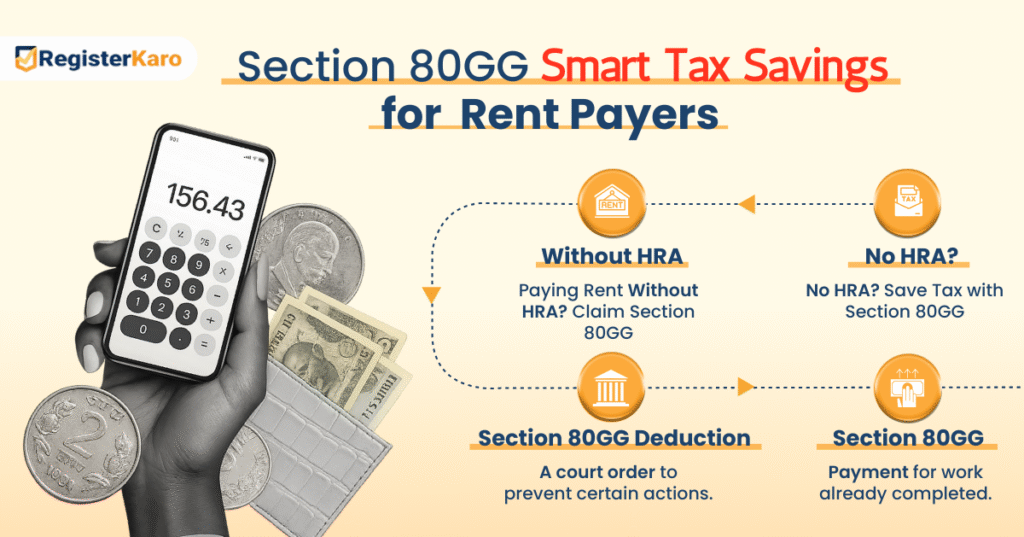
Are you paying rent but don’t receive HRA?
The deduction under section 80GG might be your financial savior! This tax benefit helps individuals who pay rent but don’t get House Rent Allowance from their employers.
Did you know that over 5 million Indian taxpayers claim deduction under section 80GG annually? This provision in the Income Tax Act offers significant relief to salaried individuals, self-employed professionals, and pensioners alike.
The deduction under section 80GG is a special provision in the Income Tax Act that allows taxpayers to claim tax benefits on rent paid. This deduction applies to individuals who don’t receive HRA as part of their salary structure.
The section 80GG deduction serves as a financial cushion for renters who would otherwise miss out on tax benefits.
You can claim deduction under section 80GG if you meet these criteria:
- You pay rent for your accommodation.
- You don’t receive any House Rent Allowance.
- You or your spouse or minor child don’t own residential property where you currently live.
- You haven’t claimed tax benefits for self-occupied property elsewhere.
The section 80GG deduction limit follows a specific calculation formula. You can claim the least of these three amounts:
- Rs. 5,000 per month (Rs. 60,000 annually)
- 25% of your total annual income
- Actual rent paid minus 10% of your total income
The deduction under section 80GG for house rent paid provides substantial savings for many taxpayers. Remember, your total income here refers to your income after other deductions under sections 80C to 80U.
Let’s look at an example to understand the 80GG section for house rent.
Rahul earns Rs. 5,00,000 in a year and needs to pay Rs. 10,000 each month for rent. He has to choose the smallest amount between the three methods of deduction in section 80GG.
- 12 full-time months of a helper equals Rs. 60,000.
- 25% of Rs. 500,000 equals Rs. 125,000.
- Rs. 1,20,000 in rents subtracted by Rs. 50,000 (10% of income) equals Rs. 70,000
So, Rahul has the right to a Rs. 60,000 tax deduction under section 80GG of the Income Tax Act.
You can follow an easy method to claim deduction under section 80GG. Take these tips to ensure you are getting all the taxes you should get.
- Make sure to submit your rent information on Form 10BA.
- Ensure you also give the Income Tax Return while submitting this form.
- If you are requested, have the rent receipts available for review.
- You must mention the landlord’s PAN when your rental amount is over Rs. 1,00,000.
The tax break you receive using section 80GG is worthwhile, though you have to submit only a few documents to qualify.
To successfully claim your section 80GG deduction, keep these documents handy:
- Duly filled Form 10BA
- Rent receipts or rent agreement
- PAN details of your landlord (for rent above Rs. 1,00,000)
- Self-declaration that you don’t own property in your current city
Self-employed professionals can also benefit from deduction under section 80GG. Unlike salaried employees, self-employed individuals never receive HRA. This makes the section 80GG deduction particularly valuable for freelancers, consultants, and business owners who rent their living spaces.
To maximize your deduction under section 80GG for house rent paid, consider these strategies:

- Monthly receipts – Collect rent receipts immediately with the landlord’s PAN and signature.
- Digital backup – Scan and store receipts in organized monthly folders.
- Payment proof – Keep bank transfer records as supporting evidence
- Legal compliance – Use proper stamp paper and include complete landlord details with PAN.
- Clear terms – Specify exact rent amounts and payment schedules.
- Timely renewal – Update agreements before expiry to maintain eligibility.
- Quarterly tracking – Calculate potential deduction using the three-method formula.
- Income planning – Estimate annual income early for accurate percentage calculations.
- Separate agreements – Create individual rent agreements for family members with independent income.
- Proportionate sharing – Distribute rent based on actual occupancy and income capacity.
- Independent payments – Ensure each member pays through separate bank transactions with distinct receipts.
NRIs and Section 80GG Deduction
Basic Rule: As per the basic rule, NRIs may use Section 80GG to get tax relief on rent for a home in India if they earn taxable income there.
Important Fact: The deduction is reviewed based on their Indian income only. Since only ₹2 lakhs is taxable in India from an NRI’s global income of ₹10 lakhs, the 25% deduction applies to just those two lakhs.
Common Scenario: A foreign-based NRI, who has a rental in Mumbai and visits every now and then, is allowed to claim this deduction against income earned in India.
Just as Before: Renters still don’t own property at the rental place and aren’t allowed to use HRA at the same time.
Paperless Process – No physical documents required during initial filing, reducing storage and handling concerns.
Faster Processing – Digital submissions are processed quicker than manual returns, often within days rather than weeks.
Real-time Validation – The system checks for errors immediately, preventing common mistakes that cause delays.
Instant Acknowledgment – Receive confirmation and ITR-V instantly upon successful submission.
Easy Tracking – Monitor your refund status and processing updates online through the income tax portal.
- Visit the official Income Tax e-filing portal (www.incometax.gov.in).
- Log in using your PAN, password, and date of birth.
- If not registered, complete the one-time registration process with mobile number and email verification.
- Choose the correct ITR form based on your income sources (ITR-1 for salary, ITR-3 for business income, etc.).
- Ensure the form supports Section 80GG deduction claims.
- Enter personal information, address, and contact details.
- Select your residential status and assessment year.
- Input all income sources accurately
- Navigate to the “Deductions” section in your ITR form.
- Locate “Section 80GG” under Chapter VI-A deductions.
- Enter the calculated deduction amount (as per the three-method rule).
- The system will automatically validate the amount against prescribed limits.
- Form 10BA is now integrated within the ITR filing process.
- Fill in landlord details including name, address, and PAN (if rent exceeds ₹1 lakh annually).
- Enter monthly rent amounts and total annual rent paid.
- Provide declaration details as required.
- Scan and upload rent receipts in PDF format.
- Upload landlord’s PAN copy if required.
- Ensure file sizes are within prescribed limits (usually 5MB per document)
- Review all entered information carefully.
- Use the built-in validation tool to check for errors.
- Submit the return digitally.
- Choose verification method: Aadhaar OTP, net banking, or physical ITR-V.
- Download and save the acknowledgment receipt.
- Track processing status through the e-filing portal.
- Respond promptly to any department queries or notices.
- Monitor refund status if applicable
Section 80GG vs HRA Benefits
| Parameter | HRA Exemption | Section 80GG Deduction |
| Eligibility | Only salaried employees receiving HRA from employer | All taxpayers (salaried without HRA, self-employed, business owners) |
| Income Type | Salary income only | All types of income (salary, business, profession, other sources) |
| Employer Dependency | Must receive HRA allowance from employer | No employer dependency required |
| Maximum Limit | No fixed limit (depends on salary structure) | ₹60,000 per year (₹5,000 × 12 months) |
| Documentation Required | Rent receipts, landlord details if rent >₹1 lakh annually | Rent receipts, landlord PAN, Form 10BA filing |
| Form Filing | No separate form required | Form 10BA must be filed |
| Property Ownership | Can own property in different city | Cannot own residential property at place of work/residence |
| Simultaneous Claim | Cannot claim Section 80GG simultaneously | Cannot claim HRA simultaneously |
| Coverage | Limited to salaried class only | Broader coverage – includes self-employed, professionals |
| Income Ceiling | No specific income limit | Available regardless of income level |
| Rent Threshold | No minimum rent requirement | Must actually pay rent (no minimum specified) |
- HRA is an exemption (reduces taxable salary income)
- Section 80GG is a deduction (reduces total taxable income)
- Cannot claim both benefits for the same rental period
- Section 80GG fills the gap for those not receiving HRA
- Form 10BA filing is mandatory for Section 80GG claims
While both provide tax benefits on rent, deduction under section 80GG differs significantly from HRA exemptions. HRA benefits apply only to salaried employees who receive this allowance. In contrast, section 80GG deduction helps those who pay rent but don’t get HRA.
The deduction under section 80GG provides valuable tax relief for renters who don’t receive HRA. By understanding the section 80GG deduction limit and eligibility criteria, you can significantly reduce your tax liability. Remember to maintain proper documentation and file Form 10BA correctly to claim your deduction under section 80GG for house rent paid.
Frequently Asked Questions
Yes, you can claim deduction under section 80GG if you pay rent to your parents. However, your parents must show this as rental income in their tax returns.




